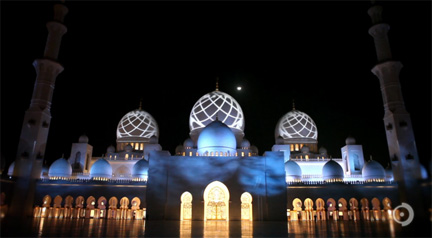
In celebration of the United Arab Emirates National Day 2011, Obscura Digital produced a very nice virtual sound-and-light projection of the Sheikh Zayed Grand Mosque in Abu Dhabi. Check it out here.

In celebration of the United Arab Emirates National Day 2011, Obscura Digital produced a very nice virtual sound-and-light projection of the Sheikh Zayed Grand Mosque in Abu Dhabi. Check it out here.
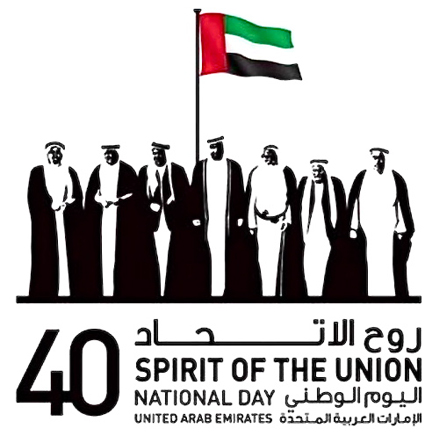
Spirit of the Union (UAE)
by el-Sayed el-Aswad, United Arab Emirates University
Over the past forty years there have been rapid transformations of the United Arab Emirates from rural and tribal communities to modern national states. Such transformations raise critical concerns related to authenticity, heritage, and social memory and identity construction. Heritage, indicating past and authentic lifestyles that people use in the construction of their identity, can be redefined according to a modern significance. Identity refers to the continuity of inherent constituents that last through all the various transformations individuals might undergo. Identity is not a given, but an ongoing activity that people engage in all the time.
In the UAE one observes continuous negotiations over ideas of authenticity, tradition, identity, modernity, leadership, and local-national performances. For example, this year the UAE is celebrating its 40th anniversary in terms of authenticity. The official site of the UAE National Day, “Spirit of the Unionâ€, includes such phrase as “Our Heritage, Our Pride,†“the Union shall forever remain,†and “It is the Spirit of the Union that celebrates our culture and heritage, and yet shapes our future.â€
Tradition is negotiated because it enters into the construction of social identity that is based on the concept of authenticity (aá¹£Äla). For the Emirates, aá¹£Äla (or aṣīl) is a multiple meaning concept that can imply values of rootedness, descent, origin, nobility, honor, self-sufficiency and social status. Authenticity also refers to good manners of people, men and women, defining gender relations. Continue reading Authenticity, Identity and the Spirit of the UAE Union

BY Karim Sadjapour, Foreign Policy, June 15, 2011
How a couple of cows explain a changing region: equal opportunity offender edition.
In the early years of the Cold War, in an effort to simplify — and parody — various political ideologies and philosophies, irreverent wits, in the spirit of George Orwell, went back to the farm. No one really knows how the two-cow joke known as “Parable of the Isms” came about, but most students of Political Science 101 have likely come across some variation of the following definitions:
Socialism: You have two cows. The government takes one of them and gives it to your neighbor.
Communism: You have two cows. The government takes them both and provides you with milk.
Nazism: You have two cows. The government shoots you and takes the cows.
Capitalism: You have two cows. You sell one and buy a bull.
Over the years, the parables gradually expanded, using the two-cow joke to explain everything from French unions (You have two cows. You go on strike because you want three cows.) to the Republican Party (You have two cows. Your neighbor has none. So what?). While in its original iteration the cows were a metaphor for currency, capital, and property, they later began to take on different meanings.
Today, the Middle East has replaced the Cold War as America’s primary foreign-policy preoccupation. As opposed to the seemingly ideologically homogenous communist bloc, however, the 22 diverse countries that compose the modern Middle East are still confusing to most Americans. Why can’t the Israeli and Palestinians stop fighting already? What’s the difference between Libya and Lebanon again?
Herewith then is a satirical effort to simplify the essence of Middle Eastern governments so that, in the immortal words of George W. Bush, “the boys in Lubbock” can read it. And, rather than symbolizing property, the cows here symbolize people, which — funny enough — is how most Middle Eastern regimes have traditionally viewed their populations.
Saudi Arabia
You have two cows with endless reserves of milk. Gorge them with grass, prevent them from interacting with bulls, and import South Asians to milk them.
Iran
You have two cows. You interrogate them until they concede they are Zionist agents. You send their milk to southern Lebanon and Gaza, or render it into highly enriched cream. International sanctions prevent your milk from being bought on the open market.
Syria
You have five cows, one of whom is an Alawite. Feed the Alawite cow well; beat the non-Alawite cows. Use the milk to finance your wife’s shopping sprees in London.
Lebanon
You have two cows. Syria claims ownership over them. You take them abroad and start successful cattle farms in Africa, Australia, and Latin America. You send the proceeds back home so your relatives can afford cosmetic surgery and Mercedes-Benzes.
Hezbollah
You have no cows. During breaks from milking on the teat of the Iranian cow you call for Israel’s annihilation. Continue reading Tabsir Redux: The Cynical Dairy Farmer’s Guide to the New Middle East
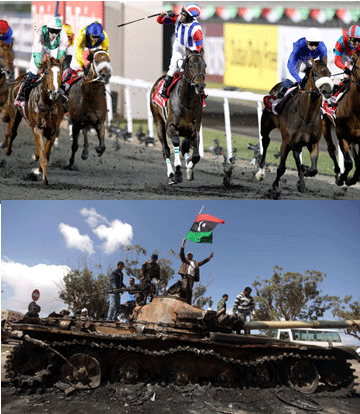
Top: Victorie Pisa from Japan, ridden by Mirco Demuro, middle, crosses the finish line of $ 10,000,000 Dubai World Cup race, the world’s richest horse race, followed by 2nd place Transcend , right, from Japan and 3rd place Monterosso from Great Britain, 2nd right. (The Associated Press); bottom:Libyan rebels on top of a captured tank
As I write this, the media are reporting major advances of the Libyan resistance to Qaddafi, supported in large part by the surgical air strikes of the U.S. and NATO aircraft. Qaddafi has bunkered down, vowing to fight until his last drop of blood, but as the race to Tripoli proceeds, more and more defections from his military are inevitable. It is hard to predict when this will end. In general I think most ruthless dictators are cowards at heart, which is why they need such massive security to perpetuate their narcissistic hold on power. But Qaddafi is deluded enough to go down with guns blazing, like Errol Flynn in Custer’s Last Stand.
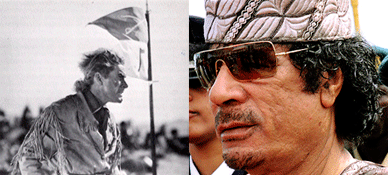
Debate over the wisdom of U.S. involvement in the Libyan no-fly-plus zone has reached a level of feverish political overtones. Obama’s opponents, those lock-step GOP stalwarts who never challenged Bush when we foolishly entered into a ground war in Iraq, now seem concerned about the costs of tomahawk missiles (I suspect those senators with large arms manufacturers in their home states are biting their tongues as they speak). Winging it, a la Bush, is the American way in their mind and damn what any other civilized nation thinks. Actually forging a coalition with U.N. and some Arab country backing is heralded as weakness. Much of the debate swirling between the talking security expert heads is really an end-around around the end-game criticism. Continue reading Racing from Dubai to Tripoli
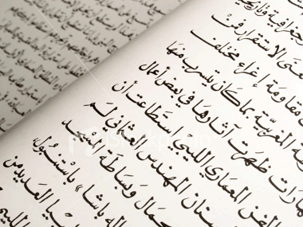
Cambridge Arabic expert made executive editor of five-year project, University of Cambridge, November 29, 2010
James Montgomery, Professor of Classical Arabic at Cambridge University, has been appointed as Executive Editor of a five-year project at the Library of Arabic Literature (LAL).
He will work in conjunction with Professor Philip Kennedy (General Editor and Faculty Director, NYUAD Institute) and Shawkat M. Toorawa, (Executive Editor and Associate Professor of Arabic and Islamic Studies at Cornell University).
The project, funded by a grant from NYUAD’s research centre, the NYU Abu Dhabi Institute, will initially publish 35 English translations of the great works of classical Arabic literature. The translations, rendered in parallel-text format with Arabic and English on facing pages, will be undertaken by renowned scholars of Arabic literature and Islamic studies. The translations will include a full range of works, including poetry, poetics, fiction, religion, philosophy, law, science, history and historiography. Continue reading Translating Arabic Literature
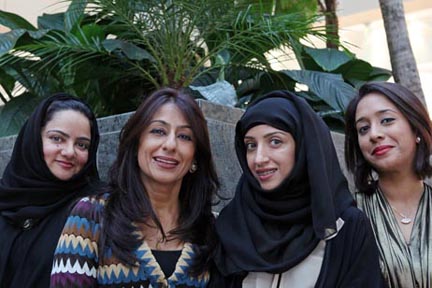
Left to right) Salwan Al Shaibani, 39, Hala Kazim, 47, Maha Jaber, 32, and Aida Al Busaidy, 27, all of Dubai. Kazim recently took the other women on an 80-kilometer hike in Austria through her program, Journey Through Change; Photo by Amy Leang / The National
Hike across Austria raises profile of Emirati women
by Maey El Shoush, The National, October 15, 2010
DUBAI // Five Emirati women who traded their abayas for backpacks have returned from a successful five-day hiking trip through Austria aimed not only at their own personal development but also at breaking down stereotypes outside the UAE.
Their tour was organised through Journey Through Change, a Dubai life coaching and organising company run by Hala Kazim, 47.
Mrs Kazim said: “I wanted to show the ladies and men in our communities, there are more things to life. This was not just a walking trip: I exposed them to different cultures, showed them how to absorb the beauty around them, and counselled them as we walked.â€
The group, composed of women from their mid-20s to 40s, walked 80 kilometres, starting at Vienna through Fuschl towards St Wolfgang, across mountainous terrain and past green fields, farms and villages. Dressed down and wearing no makeup, with minimal internet access at the bed and breakfasts where they spent each night, the trip took the women back to basics. Continue reading Abayas for backpacks
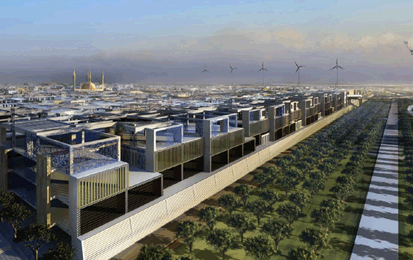
Take a look at the picture above. This is the recently operationalized city of Masdar, one that seems to come right off the drawing boards of 2001: A Space Odyssey or at least Star Wars. Imagine a city with zero carbon emissions. Imagine a perfectly planned city from top to bottom, fueled by solar power and clean as the pure desert sand. This one happens to have been built on the desert sand, only a short commute by a carbon-emitting vehicle from the city of Abu Dhabi. Forget the Seven Wonders of the Ancient World; here is Futurama out of the Arabian Nights.
Today’s New York Times has a lengthy article about the architectural feat, designed by Foster & Partners. All it takes is money (lots of money) and visionary architects. In this Disney on Sand there are even battery-powered pod vehicles, which operate underground out of sight and take people from place to place without drivers. The author of the article, Nicolai Ouroussouf, mixes praise with a dose of populist realism and rightly so: Continue reading and where is the city of the future?
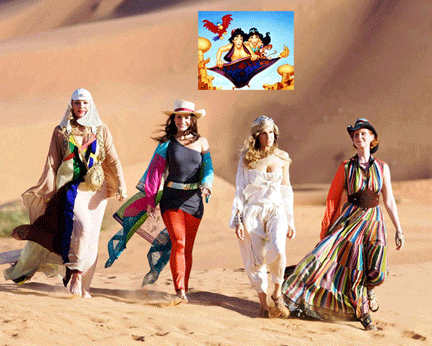
“Sex and the City 2’s” stunning Muslim clichés
It’s hard to overstate the offensiveness of the fabulous four’s exquisitely tone-deaf trip to Abu Dhabi
By Wajahat Ali, Salon, May 26
I’m a heterosexual, Muslim dude who until recently thought pleated khakis and loafers were “hip” and mistook Bergdorf Goodman for an expensive Swiss chocolate. So it is not surprising that 40 minutes into “Sex and the City 2,” a 150-minute cotton candy fantasy accessorized with materialism and fashion porn, I was comatose with boredom.
But I was defibrillated by the film’s detour into Abu Dhabi (really Morocco and studio sets) and what can only be described as an Orientalist’s wet dream. After discovering they will visit the Middle East, the ladies whip out hall-of-fame Ali Baba clichés: References to “magic carpet” (a double entendre, naturally), Scheherazade and Jasmine from “Aladdin” come in rapid succession. Upon hearing a stewardess give routine flight instructions in Arabic, Samantha behaves like a wild-eyed child hearing a foreign language for the first time. “I wonder what she’s saying. It sounds so exotic!”
Michael Patrick King’s exquisitely tone-deaf movie is cinematic Viagra for Western cultural imperialists who still ignorantly and inaccurately paint the entire Middle East (and Iran) as a Shangri La in desperate need of liberation from ignorant, backward natives. Continue reading Viagra for Aladdin Lovers